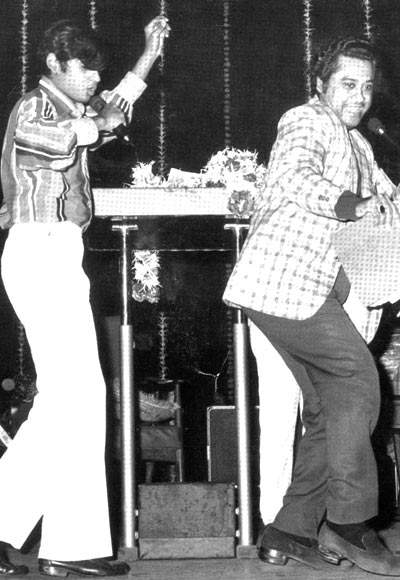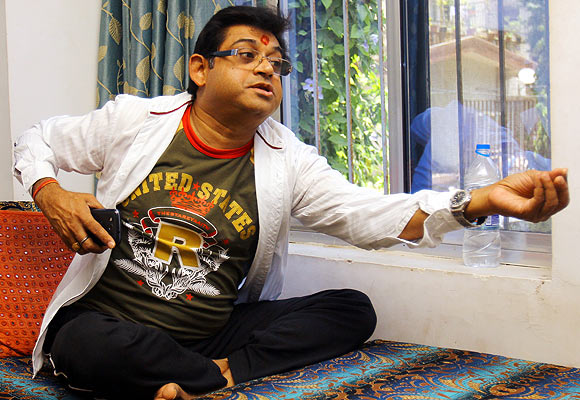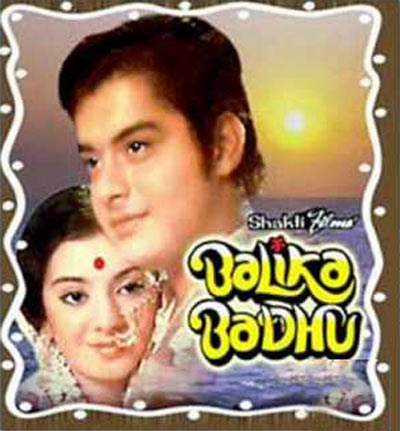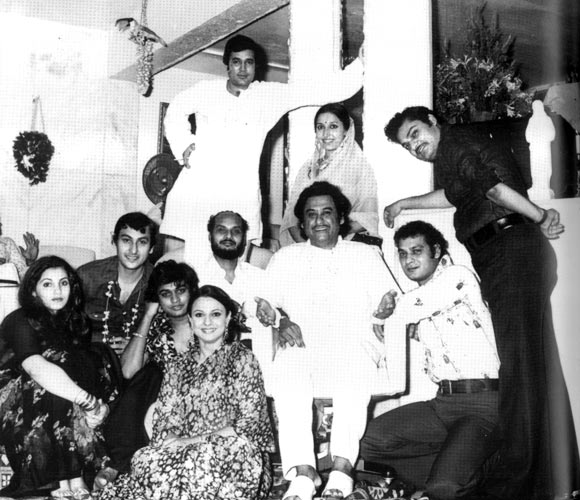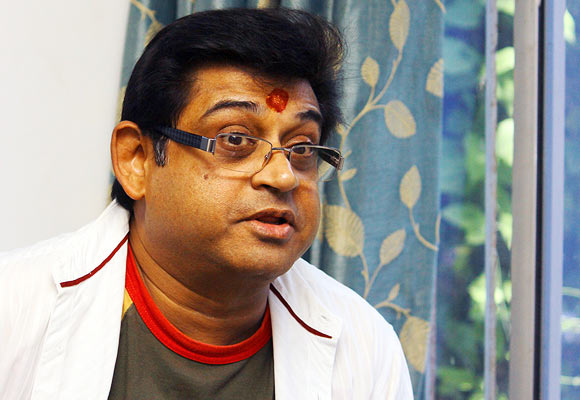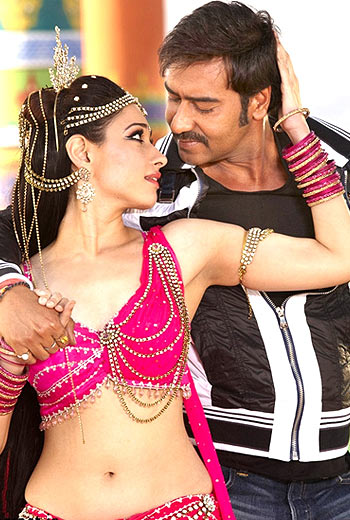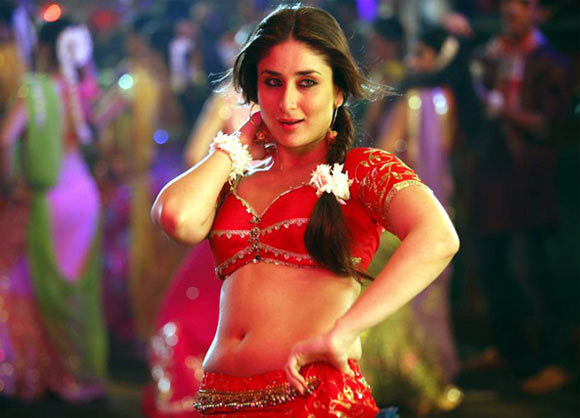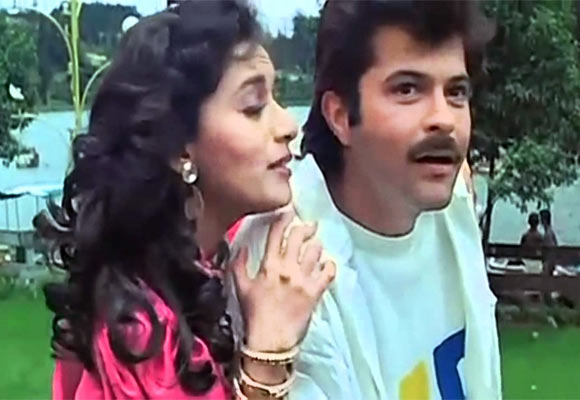 | « Back to article | Print this article |
'My father Kishore Kumar was NOT eccentric. He lived like a king'
Amit Kumar doesn't think living in a time warp is a bad thing.
Or so he lets on.
He doesn't believe in the words 'retro' and 'comeback', gestures at Rahul Dev Burman's photograph in the room like the late music composer is sitting next to him and is, at present, working to 'bring back the melody and lyrics in songs' by way of an online project with his younger brother Sumit Kumar.
There's also his version, amongst countless speculative theories, of why his singing career never really took off.
"The period of Kishore Kumar, R D Burman, Mohammad Rafi was a magical time in the Hindi film industry. I consider myself lucky to have worked with these legends in the early days of my career. But things changed for the worse and I decided this wasn't a place for me any more. So I quit," he explains.
Sprawled in an air-conditioned corner room of the Kishore Kumar House in Juhu, a western suburb of Mumbai, Kishore Kumar's elder son talks at length about his life -- the time he spent with his late father, his own career, bringing us up to date with what he's doing after quitting Bollywood in the early 1990s and his reprisal of the song Nainon Mein Sapna in Sajid Khan's remake of Himmatwala -- his first playback job ever since he called it quits in the 1990s. He also sang some of his favourite Kishore Kumar songs.
In this interview with Nishi Tiwari, the singer-music composer takes us through his life as the son of one of Hindi film industry's biggest icons, his equation with his late father and other little known aspects of the Ganguly-Kumar family.
Read on.
'My first song was cut from the film because my father didn't like it'
My initiation in music happened by watching my father (obviously), and my mother (Ruma Guha Thakurta). She was a brilliant singer.
I started singing in Kolkata in 1968-69. Before that I'd sung a song in my father's 1965 film Door Ka Rahi. The song was Main Ek Panchhi Matwala Re and was picturised on me.
It got cut because he (father Kishore Kumar) didn't like it. But the LP still has my name on it as Amit Ganguly.
So I started singing on stage in Kolkata with my friends who were amateur musicians -- guitarists, accordion players, rhythm players and bassists. We formed a group and we used to take about Rs 500 for a performance. We would spend all the money on eating out.
This was happening around the time Aradhana (1969) had released and according to people, my father had made a 'comeback.' I still don't understand why that was a comeback.
This was also around the time when I came back to Bombay. I wasn't into studies and my mother got worried. She telephoned my father in Bombay and told him that I wasn't paying attention to studies and was always out singing in one corner of the city or another.
My father was pleased at this news and immediately flew down to Kolkata. There was a show I was supposed to perform in at Ravindra Sadan. He came just to see me perform.
I was very excited and told him that I had saved him a seat in the front row. He said he wouldn't sit there. 'Koi tera gana sunega nahi, sab humko hi dekhega (Nobody will listen to you sing, everybody will look at me),' he said.
He was right. So we arranged for him to stand above the stage in the wings from where lighting is arranged. He saw my entire performance from there and nobody had a clue that Kishore Kumar was among them.
I was 19 at the time.
'I sang for many films that never released before Bade Achche Lagte Hain happened'
After that, he brought me back to Bombay and introduced me with a very big show titled 'Daddy Kishore and Sonny Amit' at Shanmukhanand hall in Sion (Central Mumbai).
Sachin Dev Burman was the chief guest of the evening. Other distinguished artists from the time -- Kalyanji-Anandji, among others -- also attended the show. I had previously accompanied him on percussions or the tabla during his various stage shows across the country.
The first playback offer I got was from the music director Sapan Jagmohan for the Ramsay Brothers' film Darwaza. I don't know if the film released or not.
Then there was Vijay Anand's Jaan Haazir Hai with Shekhar Kapoor and Prem Kishan (Prem Nath's son) in the lead roles.
Jaikumar Patil -- Kalyan-Anand's assistant -- was the music director for the film. So I, along with Manhar Udhaas and Dilraj Kaur, was launched with the film.
The film just came and went. Then I sang for a Madan Mohan film that didn't release as well. After that, I was signed on by the great Salil Chaudhary to sing for Rajesh Khanna but unfortunately that didn't materialise as well.
Things then led me to Laxmikant-Pyarelal, Kalyanji-Anandji, Rajesh Roshan and then Panchamda.
That's when the Bade Achche Lagte Hain song from Balika Vadhu happened.
That was a beautiful time. Things were very simple, people used to work together with a lot of love and respect for each other.
'I was in the studio when father recorded the Nainon mein sapna song in 1983'
I was born in Bombay in 1952. I lived here for the first seven or eight years of my life and left for Kolkata with my mother when my parents separated.
But I used to come here for summer holidays. Trips to the studio with my father were just amazing.
Whenever I was in Bombay, I'd make sure to go with him for all of his recordings. If he was recording with Panchamda, I'd reach there before everybody else. I was a huge fan.
S D Burman, Kalyanji-Anandji, Laxmikant-Pyarelal -- I've been to everybody's recording sessions. I was even there when father recorded the Himmatwala song in 1983.
But it wasn't always so. I was five years old when I first recognised my father. I used to see this man come into the house in the morning -- we used to live just opposite Juhu Church in Sekseria colony.
I would always ask my mother who this man was. She told me, 'Yeh tumhara baap hai (this is your father).' He was a top star around that time and was very busy.
But we became close as I grew up, around 1956-59 when he gave the maximum number of hits as an actor.
It was a glorious period. He used to buy his own films on the 16 mm projector. We watched many films on it including Bhai Bhai starring Ashok Kumar, a comedy starring him called Baap Re Baap, Bimal Roy's Naukri, Chalti Ka Naam Gaadi and his first Bengali film Lukochuri.
Lukochuri was made to show expenses after Chalti Ka Naam Gaadi became a huge hit. 'Let's make a flop Bangla picture to show expenses,' they said.
But that film became an even bigger hit. This house was built in 1957 with the money Lukochuri earned.
'John Wayne, Marlon Brando were my father's favourite actors'
My father and I were like friends.
He loved watching films, especially the ones made in the west. John Wayne, Marlon Brando, Montgomery Clift and Gary Cooper were his favourite actors.
In those days, Regal Cinema had 16mm reels of Paramount (the prestigious Hollywood studio) films. My father would go and buy those reels to watch on his projector at home.
We would watch all these classics on his birthday, even on my birthday.
In yet another weekend tradition that we had developed over the years, my father and I would leave the house every Friday to catch the noon show of a film and then watch films at 3pm, 6pm and 9 pm after which we would bring our tired selves home.
'He was on great terms with everyone in the industry'
My father was on great terms with everyone in the industry. He was everyone's pet and they loved him. The atmosphere would change when he entered the studio.
He was all about jokes and laughter on the sets. He was a great actor, a great dancer; there's nothing new one can say about his many talents. He was a gifted person but he really cultivated his talents. Only he knows how he worked his magic with that voice.
I haven't received proper training in music. But in 1987, the year my father died, I started taking lessons in light classical music. He was very happy about it.
After his demise, I seriously continued till 1994-95 and that really helped me a lot. My teacher was Satyanarayan Mishraji, who has also taught the likes of Alka Yagnik, Sadhna Sargam and Sunidhi Chauhan.
Whatever I am today is because of his lessons.
'I think we should create something new and leave good old songs alone'
I thought the song in the Himmatwala remake was going to be a new one. When my manager got the call, I was quite surprised to know that they'd approached me.
I got to know when I reached there that it was a remake song. The dubbing took hardly about 40 minutes. It used to take two-three days in the past. With all the digital technology that we have now, it was sounding very good.
I wouldn't say I don't like remake songs/remixes but if they are presented in a proper way, I'd have no problem. But the way they have been done so far, they may have improved in terms of technological quality but somewhere down the line I don't agree with the concept of reworking old songs.
I think we should create something new and leave good old songs alone.
Apart from that one song, I'm not doing anything, just relaxing (laughs).
I do five or six stage shows every month and that's about it. As far as films are concerned, I gave up on the rat race a long time ago.
My album MAD that was re-released in 2012 after 18 years was originally launched by PAN music in 1993. But it was not promoted. In fact all my albums came and vanished because they weren't promoted properly.
This gentleman (points at a sepia-toned picture of Rahul Dev Burman hanging on one of the walls) released the album and he was very happy, but the album was a flop because nobody did anything about it.
It was last year when my fan club in Kolkata got behind EMI (the music label that bought the rights to the album) to re-release it. And this time, three and a half lakh copies of the album were sold within a month, thanks to extensive promotions only on social networking websites like Facebook.
It was amazing.
'I'm composing a lot of songs these days'
I'm also composing a lot of songs. We've got a small studio set up by my younger brother Sumit nearby.
We are trying to start an online music recording store called Kumar Brothers Music. I've already recorded eight songs.
Now, if I'd taken these songs to a film producer, there'd be a lot of running around involved and there's a possibility that they may get rejected, which has happened with me in the past.
So Sumit came up with this idea. He said it'll be better to make your music directly accessible to fans. That will also ensure that you have all the creative freedom you need.
So you are selling your own compositions and promoting them yourself too. If this concept clicks, we have planned to invite other reputed as well as upcoming artists to join Kumar Brothers Music and create music. There won't be any interference in their work and we will promote them as well.
I have composed all the songs with some contribution from my friends Ramesh Iyer and Gaurav. Sumit has arranged the music and Leena Kishore Kumar has written the lyrics. The album is called Haan Main Hun Badnaam.
'I don't listen to new songs anymore'
You have one song -- say a Himmatwala or a Fevicol Se that make it big, unlike the old times when at least four songs from a film would become big hits.
I don't listen to new songs any more. The music nowadays is monotonous and jarring, we are neglecting the melody line.
There's no more poetry either.
Very rarely you come across a song that pulls at your heart strings. For instance, there's the Agneepath song sung by Sonu Nigam called Abhi Mujhme Kahin. I liked that song and the way he'd sung it.
When I used to work in Hindi films 15 years ago, we had composers like Anand-Milind, Viju Shah -- that was talent -- even Anu Malik, Nadeem-Shravan, they gave good music.
Even before that there was him (gestures at the Burman picture again), we can't even begin to describe the kind of work he did.
When Bappi Lahiri arrived on the scene people said that he's only doing disco numbers. But his songs are so good to listen to even today.
Today's music is not hitting here (touches his heart).
'It's not difficult to work in films'
I was in the forefront from 1987 to 1994, after that I stopped singing.
I wasn't enjoying it any more. I didn't want to work in that atmosphere. There was a lot of politics happening and I didn't want any part of it so I made my way out. It wasn't like I was kicked out.
It doesn't make a difference to me. I am what I am; my fans still keep track of my work. I have been working for Bengali films though.
It's not difficult to work in films; it's just that you have to do certain things that you don't personally approve of. You have to be on the move constantly.
People say that my father was eccentric but actually he wasn't. That man lived like a king and knew that he could get away with anything. It's as simple as that.
But everyone loved him and didn't mind his eccentricities. It was because people knew that he was a simple man and that he didn't mean anyone harm.
Besides, he was Kishore Kumar, a man who rose from the ashes several times. He used to tell me that he has seen many ups and downs in life, setbacks that even his older brother Ashok Kumar hadn't experienced.
Ashok Kumar did struggle for a while as a newcomer but after that it was all success for him. On the other hand, my father's career graph saw many highs and lows.
He'd seen everything. He used to say, "I'm the same Kishore Kumar, only my time has changed.'
When he was going through a rough phase, people would say things like, Kishore Kumar ko mat lo, vo doobta sooraj hai (Don't sign Kishore Kumar, he's a setting sun).'
But once he came out on top again, everybody wanted to sign him.
